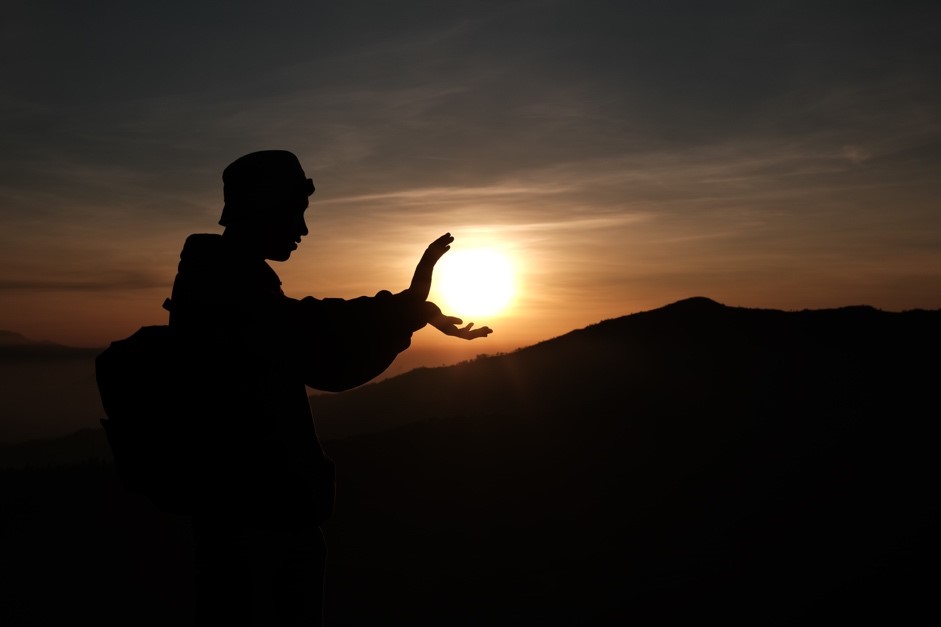“Vibrate like a samurai, don’t tremble like a common man.”
– Natori Masazumu
Lucian James is a strategist, and one of my favorite modern thinkers. I’ve have had the pleasure of collaborating with him over the years and highly value his perspective and ideas. Bold, bright, empathetic and deeply insightful, Lucian has a powerful combination of clarity and imagination that is rare. He works with leaders of creative industries to simplify and streamline their work using a combination of strategic planning, mindset training and performance coaching. In particular, he helps clients to step up their game and get to the next level by mastering the fear and resistance that gets in the way – and which we often can’t see. His work is partly inspired by Japanese traditions of fearlessness, particularly martial arts and Zen. In this interview, Lucian helps us learn how fear can negatively impact performance, imagination, and strategy in our pandemic world. Lucian is also the author of The Fearless Strategies, a weekly digest of practical insights and activities for dealing with fear. Lucian joins us today from Paris.
The following has been edited for clarity and brevity. Please listen to the full interview HERE in an Overhead Space podcast.
Jane Cavalier: Hi Lucian. Thank you for joining us today. Before we begin, we’re deep into the COVID-19 quarantine in the US. Can you tell us what the mood is like in Paris?
Lucian James: The mood in Paris is cautiously optimistic. The lockdown ended two weeks ago. Everyone is cautiously returning to what they can and being creative in new ways of doing things when they can’t. Cafes are still not open, so it doesn’t feel very typically Parisian yet, but that’s hopefully going to change in a few weeks.
Jane: You’ve spent your career addressing a breadth of strategic challenges over decades. What kind of challenges do business leaders now face?
Lucian: What people are really going to need is more imagination and more strategy. Imagination to think beyond the fear and the uncertainty to clearly grasp the opportunities that are there. And, more strategy since every part of every business, even a relatively minor part that may not have been critical before, now needs to be fully thought through as that small detail may be the difference between your business surviving or not making it through.
Fear is a big challenge, as fear can narrow the imagination and make you risk-averse, make you avoidant, make you stick to the same old patterns. The thing that I think is most critical now is being able to think beyond anything we’ve done before. Unless we can really have the imagination to think about how to completely rebuild the business if necessary, then we’re going to be caught more in old habits than really seizing whatever might emerge from this.
Jane: There have been lots of imaginative solutions emerging out of the pandemic, and many are so simple.
Lucian: There’s so much simple creativity coming out of this. The Tate Modern Gallery in London just did a really simple Twitter campaign where they basically said, “You can’t come in and look at our art, so show us what’s on your walls.” People were just sending pictures of anything that was on the walls at home and it got everyone talking about Tate. If you get into a place of great fear, a simple idea like that won’t be available to you because you’ll be in a defensive crouch. It’s a good example of the kinds of ideas that become available if you can tolerate uncertainty.
Jane: You talk about the high level of fear today, and how we must take steps to better manage it if we are to navigate and excel.
Lucian: What I’m noticing in the 21st century is that pressure has cranked up to such an extent that everybody is experiencing the same kind of fear that a martial artist or a boxer or a fighter might experience facing an opponent. One of the things that martial arts has taught me is how to be incredibly calm under incredible amounts of pressure. There’s almost a reverse relationship. The more the pressure goes up, the more calm you become. I’ve always been fascinated by that mindset. What I focus on is helping people access those places where they can be both under incredible amounts of pressure but not feel it, not feel the fear and not be shrunken or tightened up because of the environment that they’re in. It’s the defining skill of martial arts, to be aware and available and calm and loose while tolerating enormous amounts of fear.
Jane: What are you observing now in the business leaders you coach, that you haven’t seen before?
Lucian: There’s a point at which the everyday stress that leaders deal with tips over into a certain kind of … low level trauma where you’re losing a sense of safety for the business and for yourself. I think in these kinds of environments, leaders must take some measure of self-care – even just to sleep well, eat well and drink water. Big leaders with big lives expect that they need very complicated solutions to their challenges and sometimes the answers are incredibly simple. Getting back to the basics of really looking after yourself is fundamental.
One of the big topics that I deal with is adrenaline management. Everything of a contemporary age is really around adrenaline. We’re abusing our adrenaline levels to astonishing degrees, and so we get burned out very quickly. What this reset has done is allowed us to de-trigger our adrenaline levels so we’re getting back to a stage where we can rest, digest, relax and really restore some parts of our bodies that may not have been restored for a long time.
Jane: In your weekly digest, The Fearless Strategies, you provide guidance on how to deal with fear and draw primarily on ancient Japanese wisdom. Why?
Lucian: For all kinds of reasons, Japan has developed a very good understanding of how to manage fear. The whole martial arts tradition is about managing your fear. The whole of Zen Buddhism is essentially managing fear. And there’s a morality and a discipline that comes from all of that, which means that there are so many basic tools, both practical ideas and bigger concepts, that are known and used in Japan that don’t reach the West very easily.
The martial art Aikido is a good example. When you’re your opponent is pushing towards you, you essentially get out of the way so that they fall flat on their face. You don’t push back. It’s about using the energy of an opponent and creating something with it. There’s something very harmonious and very powerful about that. It saves a lot of energy, a lot of resistance. That’s one of many, many ways that I’m just inspired by how Japan goes about tolerating fear, managing fear, and actually creating amazing things from fear.
Jane: What advice do you have for entrepreneurs and independent professionals trying to make their way in this very uncertain world?
Lucian: In these moments, there is a danger in thinking the world is completely unmoored, because that will make you much more unmoored. The world may be completely unmoored or it may be the opposite. It may be fine. One of the most important ways to navigate through this is not to lean too heavily on this is an incredible opportunity or this is a total disaster, or this means something important about a new age that’s dawning. All of those are hypotheses and they’re interesting, but one of the things that you learn from martial arts in Japan is not to make any assumptions. Because in making assumptions, you’re going to lean too heavily on a certain set of data and what you really need is an incredibly clear-sighted view of exactly what’s in front of you without labeling it really, really good or really, really, bad or really, really scary or really anything. It’s a question of seeing it clearly without emotions so that you can respond in the most creative way.
Jane: Getting that kind of clarity is not easy.
Lucian: It’s not because we naturally, as human beings, we’re meaning-making machines that want to make sense of this. But again, one of the big things that all fighters, all martial artists learn is to stay open to any possibility. Sometimes when I work with fighters, if they’re trained in a certain way, then they’re going to always respond in the same way – and your opponent is going to know exactly how you typically respond. It’s a tough challenge, but the more emotion you can take out of it and the more labeling you can take out of it in terms of this is very, very good or this is very, very bad, the more opportunities appear in terms of how to move forward.
Also, if you’re a fighter and you lose a fight, you get up the next day and watch the video. You study exactly how you lost. It’s so healthy. Yet if we non-fighters, fail in some way, we want to avoid thinking about it, we want to avoid talking about it. I love the ability to lean into fear, see what it can mean and see how it can drive you forward.
Jane: People don’t really understand the constructive power of personal fear, do they?
Lucian: Well, people try and avoid fear because the fear is scary. But, if you lean into it, you can create incredible things with it. And what you learn from martial arts is that fear is just part of the journey. If you can get through fear and get to the other side of it, you’ll create something incredible. Fear is not a sign that something’s wrong. It’s a sign that something important is happening.
If you would like to subscribe Lucian’s weekly digest The Fearless Strategies, click here.
Please listen to the full interview HERE in an Overhead Space podcast.
FACT FOR THOUGHT
+647%
Americans stocked up on yeast during the pandemic to make their own bread. For the first week of April, baking yeast sales were 303% higher than the same week of 2019. Two weeks prior, sales of yeast were 647% higher than they were for the same week last year.
– Nielsen
Enjoying Overhead Space? There’s More to Love.
Subscribe to Overhead Space to receive mind-expanding content that helps you connect the dots in new ways.




